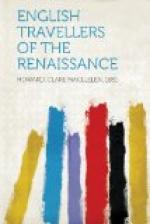To live in the household of a learned foreigner, as Robert Sidney did with Sturm, or Henry Wotton with Hugo Blotz, was of course especially desirable. For there were still, in the Elizabethans, remnants of that ardent sociability among humanists which made Englishmen traverse dire distances of sea and land to talk with some scholar on the Rhine—that fraternizing spirit which made Cranmer fill Lambeth Palace with Martin Bucers; and Bishop Gardiner, meanwhile, complain from the Tower not only of “want of books to relieve my mind, but want of good company—the only solace in this world."[79] It was still as much of a treat to see a wise man as it was when Ascham loitered in every city through which he passed, to hear lectures, or argue about the proper pronunciation of Greek; until he missed his dinner, or found that his party had ridden out of town.[80] Advice to travellers is full of this enthusiasm. Essex tells Rutland “your Lordship should rather go an hundred miles to speake with one wise man, than five miles to see a fair town.” Stradling, translating Lipsius, urges the Earl of Bedford to “shame not or disdaine not to intrude yourself into their familiarity.” “Talk with learned men, we unconsciously imitate them, even as they that walke in the sun only for their recreation, are colored therewith and sunburnt; or rather and better as they that staying a while in the Apothecarie shop, til their confections be made, carrie away the smell of the sweet spices even in their garments."[81]
There are signs that the learned men were not always willing to shine upon admiring strangers who burst in upon them. The renowned Doctor Zacharias Ursinus at Heidelberg marked on his doorway these words: “My friend, whoever you are, if you come here, please either go away again, or give me some help in my studies."[82] Sidney foresees the difficulty his brother may have: “How shall I get excellent men to take paines to speake with me? Truly, in few words: either much expense or much humbleness."[83]
If one had not the means to live with famous scholars, it was a good plan to take up lodgings with an eminent bookseller. For statesmen, advocates and other sorts of great men came to the shop, from whose talk much could be learned. By and by some occasion would arise for insinuating oneself into familarity and acquaintance with these personages, and perhaps, if some one of them, “non indoctus,” intended journeying to another city, he might allow you to attach yourself to him.[84]




